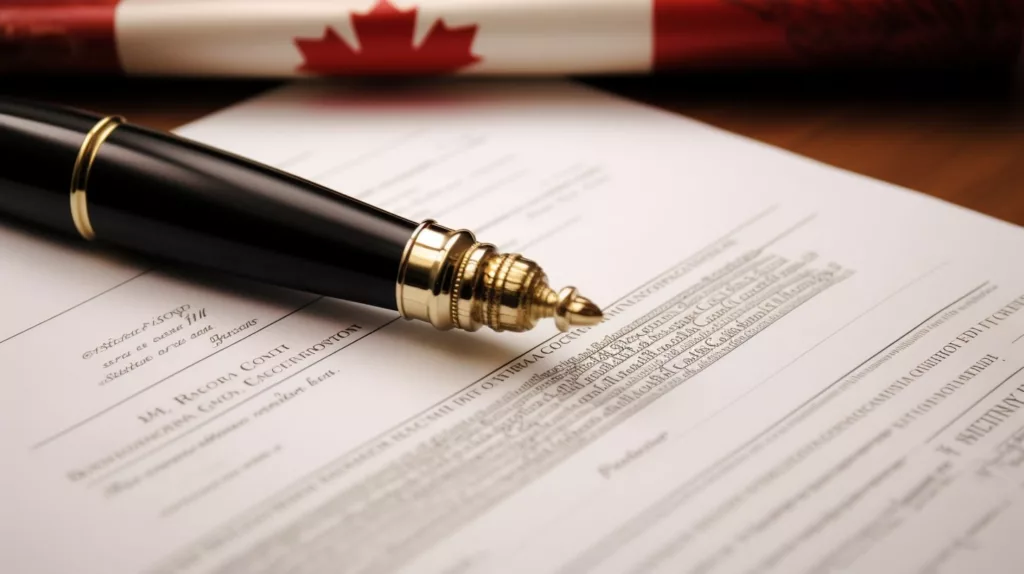Table of contents
Family reunions are precious and become even more so when they cross international borders. If you plan to bring your parents or grandparents to Canada for an extended visit, you’ll need to navigate the Canadian Super Visa process. This article provides a comprehensive checklist of the necessary documents and a step-by-step guide to the application process. We aim to make the process as smooth as possible, so you can focus on what truly matters – spending quality time with your loved ones.
What is a Canadian Super Visa?
The Canadian Super Visa is a multi-entry visa that allows parents and grandparents of Canadian citizens or permanent residents to stay in Canada for up to two years at a time. Unlike a standard visitor visa, which is valid for six months, the Super Visa provides a longer, more flexible option for family visits.
Who can apply for a Super Visa?
The Super Visa is available to parents and grandparents of Canadian citizens or permanent residents. The applicant must be found admissible to Canada and meet certain other conditions. It’s important to note that dependents of the parent or grandparent are not eligible for the Super Visa. However, they can apply for a regular visitor visa.
The Essential Checklist: Required Documents for Canadian Super Visa

Navigating the immigration process can be daunting, but having a clear list of required documents can simplify the task. Here’s your essential checklist for the Canadian Super Visa application.
| Document | Description | Details |
|---|---|---|
| Application Form | Fully completed Super Visa application form | Must be filled out accurately and in full (available online or paper based) |
| Proof of Relationship | Documents establishing the relationship to the Canadian citizen or permanent resident | Birth certificates, baptismal certificates, or other official documents |
| Letter of Invitation | A letter from the Canadian child or grandchild promising financial support | Must include a list of people in the household, a copy of the person’s Canadian citizenship or permanent resident document, and a promise of financial support |
| Proof of Parent’s or Grandparent’s Dependence | Proof of financial dependence if applicable | Bank statements, income tax documents, or financial records |
| Medical Insurance Coverage | Private medical insurance from a Canadian insurance company | Valid for at least one year, covering health care, hospitalization, and repatriation with at least $100,000 emergency coverage |
| Written and Signed Commitment of Financial Support | A signed letter of financial commitment from the child or grandchild in Canada | The commitment should include support for basic needs such as food, clothing, and accommodation |
| Proof of Income | Proof of the Canadian child or grandchild’s income | Employment letters, pay stubs, tax returns |
| Immigration Medical Exam (IME) | A required medical examination by a panel physician approved by IRCC | Includes a general physical examination, chest X-rays, and blood tests |
Proof of Relationship
You’ll need to provide documents that prove your relationship to the Canadian citizen or permanent resident you’ll be visiting. This could include birth certificates, baptismal certificates, or other official documents that show your parents’ names. Remember, the more official the document, the better.
To be eligible for a super visa, you must have a signed letter from your child or grandchild who invites you to Canada that includes:
- a promise of financial support for the length of your visit
- the list and number of people in the household of this person
- a copy of this person’s Canadian citizenship or permanent resident document
Proof of the Parent or Grandparent’s Dependence
If the parent or grandparent is financially dependent on the child or grandchild, proof of this dependence is required. This could be in the form of bank statements, income tax documents, or other financial documents.
Medical Insurance Coverage from a Canadian Company
One of the key requirements for the Super Visa is proof of private medical insurance coverage from a Canadian insurance company. The insurance policy must be valid for at least one year and cover health care, hospitalization, and repatriation.
This medical insurance needs to:
- be paid in full or in instalments with a deposit (quotes aren’t accepted)
- be valid for at least 1 year from the date you’ll enter Canada
- cover your health care, hospitalization and repatriation
- provide at least $100,000 in emergency coverage
Written and Signed Commitment of Financial Support
The child or grandchild in Canada must provide a written and signed letter of commitment to support the parent or grandparent financially during their stay. This includes providing for their basic needs, such as food, clothing, and accommodation.
Proof of Income
The child or grandchild in Canada must also provide proof of their income to show they can support the visitor. This could include employment letters, pay stubs, or tax returns.
Immigration Medical Exam (IME)
All Super Visa applicants must undergo an Immigration Medical Exam (IME) by a panel physician approved by Immigration, Refugees and Citizenship Canada (IRCC). The IME includes a general physical examination, chest X-rays, and blood tests.
The Application Process: Step-by-step Guide
Applying for a Super Visa involves several steps, from filling out the application form to gathering the required documents, paying the application fees, and finally, submitting the application. We’ll guide you through each step to ensure a smooth application process.
Filling out the Application Form
The first step in the Super Visa application process is to fill out the application form. This form asks for detailed information about you, your family, your background, and your purpose of visit. It’s crucial to answer all questions honestly and completely. Incomplete or incorrect information can lead to delays or even rejection of your application. The form can be filled out online or downloaded and filled out by hand.
Gathering the Required Documents
Once you’ve completed the application form, the next step is to gather all the required documents. This includes proof of relationship, proof of the parent or grandparent’s dependence, medical insurance coverage from a Canadian company, a written and signed commitment of financial support, proof of income, and the results of the Immigration Medical Exam (IME). Make sure all documents are current, official, and in good condition.
Paying the Application Fees
There are fees associated with the Super Visa application, which must be paid at the time of application. These fees include the visa processing fee and the fee for the Immigration Medical Exam (IME). Fees can be paid online using a credit card.
Submitting the Application
Once you’ve filled out the application form, gathered all the required documents, and paid the application fees, it’s time to submit your application. Applications can be submitted online or by mail. If you’re applying by mail, make sure to send your application to the correct address and keep a copy of all documents for your records.
What to Expect After Application
After you’ve submitted your Super Visa application, there’s a waiting period while your application is processed. During this time, being patient and prepared for possible outcomes is important.
The Waiting Time
The processing time for a Super Visa application can vary depending on the volume of applications received and the complexity of your case.
As of the time of writing, the processing time for family sponsorship of parents or grandparents is approximately 23 months.
Parents or grandparents: Outside Quebec
23 monthsThis processing time includes how long it takes
- for the person being sponsored to give their biometrics
- for your and their assessment
- for us to make sure they meet eligibility requirements
You may be able to visit Canada sooner with a Super Visa.
Pulled from IRCC’s process times page.
Always check the official IRCC website for the most current information on processing times.
Possible Outcomes and Their Implications
Your Super Visa application has three possible outcomes: approval, refusal, or request for more information. If your application is approved, you’ll receive your Super Visa and can start planning your trip to Canada. If your application is refused, you’ll receive a letter explaining the reasons for the refusal. If more information is needed, you’ll receive a request for additional documents or clarification.
Overcoming Potential Challenges
Applying for a Super Visa can present some challenges, but with preparation and patience, these can be overcome.
Dealing with Application Delays
If your application is taking longer than expected, it can be frustrating. However, it’s important to remember that each application is unique and processing times can vary. If you’re concerned about the delay, you can check the status of your application online on the IRCC website.
Steps to Take in Case of Application Rejection
If your Super Visa application is rejected, it can be not very pleasant. However, it’s not the end of the road. The refusal letter will explain the reasons for the rejection, and you can use this information to improve your application and reapply. It may also be helpful to seek legal advice or assistance from an immigration consultant.
Concluding Thoughts: Seize the Moment for Family Reunion
Applying for a Super Visa can be a complex process, but with the right preparation and guidance, it’s a hurdle that can be overcome. The reward – a family reunion in Canada – is well worth the effort. Remember, the key to a successful application is thorough preparation, honesty in your application, and patience during the waiting period. Seeking help from immigration experts can ensure your best chances at success.
Hire Immigration Experts: Pax Law Knows the Ins and Outs of Canadian Immigration

Reach out to our team and get immediate help with your immigration challenges by contacting here.
Frequently Asked Questions
What is the validity period of the Super Visa?
The Canadian Super Visa is valid for up to 10 years. However, each visit to Canada can last up to 2 years at a time, after which the visa holder must either leave Canada or apply for an extension.
Can I work in Canada with a Super Visa?
The Super Visa does not grant the right to work in Canada. It is intended for Canadian citizens’ or permanent residents’ parents and grandparents to visit their family in Canada. If you wish to work in Canada, you would need to apply for a work permit or other type of visa that allows employment.
How much does it cost to apply for a Super Visa?
As of the time of writing, the application fee for a Super Visa is CAD $100. However, there are additional costs to consider, such as the cost of the Immigration Medical Exam (IME) and the cost of medical insurance from a Canadian company. It’s also important to note that the application fee is non-refundable, even if the application is not approved.
Can the Super Visa be renewed while in Canada?
Yes, the Super Visa can be extended while you are in Canada. However, you must apply for an extension at least 30 days before the expiry of your current status. It’s important to note that the decision to grant an extension is made on a case-by-case basis and is not guaranteed.
Is there a guaranteed approval for a Super Visa application?
No, there is no guaranteed approval for a Super Visa application. Each application is evaluated individually based on the information and documents provided. Factors such as the applicant’s ties to their home country, the purpose of the visit, the applicant’s family and financial situation, and the home country’s overall economic and political stability can all influence the decision.
Sources
- “Super Visa (for Parents and Grandparents): About the Document – Canada.ca.” Canada.ca, 2023, www.canada.ca/en/immigration-refugees-citizenship/services/visit-canada/parent-grandparent-super-visa/about.html. Accessed 15 Dec. 2023.
- “Super Visa (for Parents and Grandparents): Who Can Apply – Canada.ca.” Canada.ca, 2023, www.canada.ca/en/immigration-refugees-citizenship/services/visit-canada/parent-grandparent-super-visa/eligibility.html. Accessed 15 Dec. 2023.
- “Super Visa (for Parents and Grandparents): Get Your Documents Ready – Canada.ca.” Canada.ca, 2023, www.canada.ca/en/immigration-refugees-citizenship/services/visit-canada/parent-grandparent-super-visa/get-documents.html. Accessed 15 Dec. 2023.
- “Super Visa (for Parents and Grandparents): How to Apply – Canada.ca.” Canada.ca, 2023, www.canada.ca/en/immigration-refugees-citizenship/services/visit-canada/parent-grandparent-super-visa/apply.html. Accessed 15 Dec. 2023.
- “Super Visa (for Parents and Grandparents): After You Apply – Canada.ca.” Canada.ca, 2023, www.canada.ca/en/immigration-refugees-citizenship/services/visit-canada/parent-grandparent-super-visa/after-apply-next-steps.html. Accessed 15 Dec. 2023.
- “Parent and Grandparent Super Visa – Canada.ca.” Canada.ca, 2023, www.canada.ca/en/immigration-refugees-citizenship/services/visit-canada/parent-grandparent-super-visa.html. Accessed 15 Dec. 2023.
- “Check Processing Times – Canada.ca.” Canada.ca, 2023, www.canada.ca/en/immigration-refugees-citizenship/services/application/check-processing-times.html. Accessed 15 Dec. 2023.



0 Comments